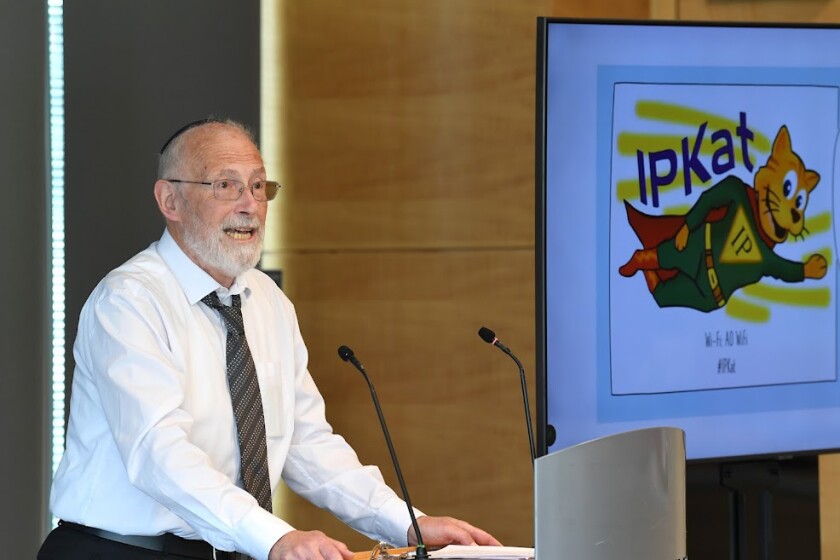We at Managing IP don’t usually write about other intellectual property publications.
Even in such a niche field as IP, publications are usually busy enough trying to stand out and draw attention to their own work.
But The IPKat blog team was kind enough to invite Managing IP to its 20th birthday celebrations at the London office of Allen & Overy last Thursday, June 8.
We went along, not just in the spirit of ecumenism but also out of appreciation.
I started working as an IP journalist with very little knowledge of the subject or any legal background to speak of.
The IPKat’s accessible style made it an inviting resource for a history and philosophy graduate who had lived in blissful ignorance of standard essential patents to that point.
As former England and Wales Court of Appeal judge Sir Robin Jacob told attendees: “The thing that makes The IPKat different is that it’s always had a sense of humour.
“All the others are serious,” he added.
Managing IP would plead its case for being funny occasionally, but we take the point.
Several of the current IPKat team have also been valued sources and contributors to this publication over the years.
In fact, the ties between the two titles go even deeper.
Readers of Managing IP will probably be familiar with The IPKat but may not know about the two publications’ shared origins.
Both were founded by Jeremy Phillips, a now-retired law professor, who was present last Thursday to celebrate the occasion.
Phillips founded Managing IP in 1990, and The IPKat followed in 2003.
Speaking at the event last week, Phillips explained how he, a then “tired and put-upon” professor in IP law at Queen Mary University in London, thought up the idea for The IPKat.
He wanted a way of keeping his students up to date with the latest developments in IP law.
The problem was that the students weren’t very interested.
“All they wanted to do was have a good time in London and not get themselves or anyone else pregnant,” he said.
The fact that it was summer (the blog started in June) didn’t help matters.
But The IPKat’s updates greatly interested IP practitioners, and word of mouth spread quickly among the profession.
The blog is now an established name and a fixture in many practitioners’ reading diets.
Even so, many readers probably don’t know how it should be pronounced – the IP in the name rhymes with ‘hip’, Phillips clarified.
It’s probably all the better, in that case, that his original idea of “IP Alligator” was discarded.
Judicial well-wishers
The esteem in which the blog is held was underlined by the attendance of current and former judges, including Lord Justice Richard Arnold of the Court of Appeal, who gave the keynote address.
There was perhaps no better choice since, as Arnold himself noted, The IPKat’s tenure coincides almost exactly with his career as a judge.
The first of Arnold’s cases The IPKat picked up on was a copyright dispute in 2003 between the Premier League and Panini over the Italian publisher’s iconic football stickers.
That case was significant in so many ways. The Premier League and its clubs have since built a sports business empire based largely on exploitation and enforcement of their IP. But the case also underlines the blog’s longevity.
Arnold went on to recount the major shifts in IP law in the 20 years since.
These included some substantial reforms to the judiciary itself, such as the foundation of the Intellectual Property Enterprise Court in 2013 and the introduction of appointed persons to hear appeals against the decisions of the UKIPO.
On the latter point, Arnold said there was still “unfinished business”. Appointed persons still do not hear patent cases, while Arnold always thought they should.
‘Disappointing’ diversity trends
But there are some other aspects of the IP profession that have changed little in the last two decades.
The judiciary in England and Wales has been reshuffled significantly and many of the counsel who appeared in the first cases documented by The IPKat have become full-time judges.
Unfortunately, noted Arnold, all of them are white males and former barristers.
Arnold said he was disappointed at the lack of diversity in the judiciary.
Of the IP judges, including part-timers, Arnold noted that only one – Daniel Alexander KC – is not white.
“There is more to be done. The problem lies in the pool from which judges are recruited,” Arnold said.
Arnold’s words are perhaps no surprise given the remarks of his colleague Lady Justice Kathryn Thirlwall, with whom he shared the bench in the recent Advanced Bionics v Med-El case.
Thirlwall reprimanded Adrian Speck KC for the opening paragraph of his skeleton brief, which referenced the professional background of Mr Justice Campbell Forsyth, a deputy High Court judge and practicing solicitor.
“I wouldn’t expect to see that sort of observation made in anyone’s skeletons before this court,” she said.
There is rumoured to be a desire held by some Court of Appeal judges to stamp out an apparent prejudice among some barristers against solicitor-advocates and solicitor-judges.
That would be entirely consistent with Arnold’s view that judges need to be recruited from a bigger pool of candidates.
Judicial diversity is clearly a priority of Arnold’s, given he chose to centre his keynote on it.
Managing IP has little doubt that The IPKat will go from strength to strength and chart any progress that is made in that regard.
We will endeavour to do the same.











